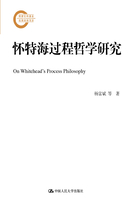
PREFACE TO ON WHITEHEAD’S PROCESS PHILOSOPHY
John B.Cobb,Jr.
Sadly,I cannot read this book.I write based only on my acquaintance with the author who used to come to Claremont as senior visiting scholar at our center for Process Studies last year,during his study here,we had many productive conversations,and on reading the table of contents.On this basis I can say that this book confirms my expectation that the center of Whitehead scholarship is moving to China.I do not say that it has moved,but the circumstances are such that one can expect this to happen.
Many Westerners ask why China has been so much receptive to Whitehead’s philosophy that the West.I think the answer is that Chinese know that philosophy matters.The West does not.
This Western ignorance has dire consequences.It leads to the lack of examination of the philosophical assumptions associated with the Enlight‐enment remain in force even when many of the specific ideas of the En‐lightenment are outgrown.
For example,everyone now knows that human beings are part of the natural world.The metaphysical dualism articulated so emphatically by Descartes is clearly mistaken.But the assumptions operative in the studies of human civilization remain radically different from the assumptions oper‐ative in the sciences.The metaphysics of our universities remains dualistic while its explicit teaching rejects that dualism.
If,in the West,one points out this confusion,one is told that such philosophical questions are of no importance.Each discipline has its own methods and subject matter and gets along fine without concerning itself with any wider or deeper questions.Questioners show that they are out‐of‐date.And being current is far more important than being right.
Within the sciences the situation is similar.As long as one has theo‐ries that are productive,one regards questioning them in any other respect as not acceptable.The fact that the theories operative in relativity theory are not acceptable in either geometry or quantum theory makes no differ‐ence.
The power of the inherited philosophy is enormous.It is,of course,reductionist and materialist.This metaphysics implies that the phenomena we call parapsychological,such as mental telepathy,cannot exist.There is,of course,a great deal of evidence that they do exist.But because they can‐not be reconciled with the assumed(and unexamined)philosophy,they are ignored or rejected.
I find it ironic that scientists criticize the Catholic church of Galileo’s day because the Aristotelian astronomers of the papal court refused to look at the skies through a telescope.They are correct that refusal to examine evidence is bad science.The scientists refused to look because what they were told they would see contradicted the Aristotelian philosophy to which they were committed.But scientists today quite similarly refuse to look at piles of data compiled by scientific students of parapsychology because they contradict the Cartesian philosophy to which they are committed.Sadly human beings who understand themselves as scientists remain human be‐ings who do not want to have their fundamental beliefs challenged even when they pride themselves on their openness to evidence.
China has copied much of Western thought.Its universities are largely structured on the same patterns as those of the United States.But it is my hope and belief that Chinese are less attached to the Cartesian philosophy that has so deep a hold on the Western psyche and educational system.Chinese remember that Marxist thought provided somewhat different as‐sumptions on which to build a civilization.They know that more than one set of possibilities exist.It makes sense to examine our options.To ac‐knowledge failures in the Cartesian assumptionsis not so difficult.Chinese are,therefore,more willing to examine the evidence even if means thinking philosophically.Since Whitehead’s thought is far more compatible with the evidence,it has a chance for being seriously considered.
It is my belief that the willingness to examine philosophical assump‐tions will prove a great advantage to Chinese,and that if they do not give up this willingness through their imitation of the West,they will surpass the West in many fields.I believe Whitehead can play a major role in ex‐ploring the failures and limitations of Cartesianism and pointing the way ahead.Accordingly,I think it likely that China will be the leader in the study of Whitehead.
For the most part,the Chinese interest in Whitehead is in the practical implications of his thought for education,for economics,for ecology,for agriculture,for counseling,and so forth.But Chinese are more likely than Westerners to understand that it is also important to study rigorously and critically the system of thought that offers a replacement of the Carte‐sian system and a way that offers genuinely wise guidance in many fields.Professor Yang Fubin is engaged in this essential project.Without it,Whiteheadianism in China will wither.We may be most interested in the blades of grass or the blossoms of flowers.But grass and flowers cannot survive without roots.The ongoing study and critical development of the roots of Whiteheadian thought will be a task at which Chinese can excel.May they do so!
May 5,2013
Claremont,California,USA